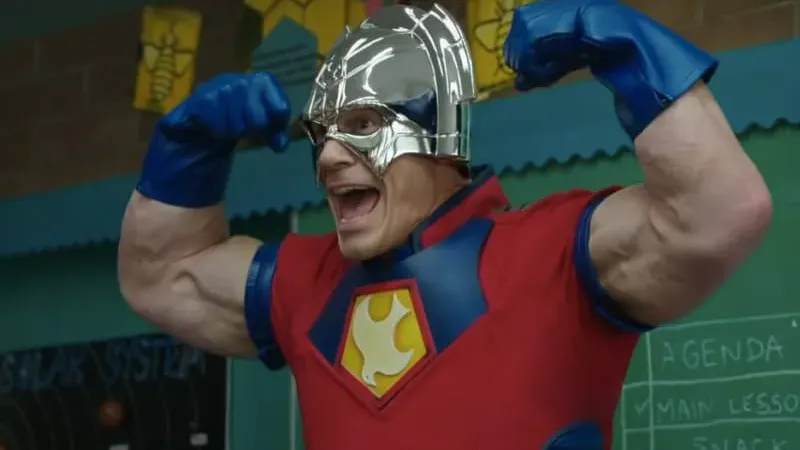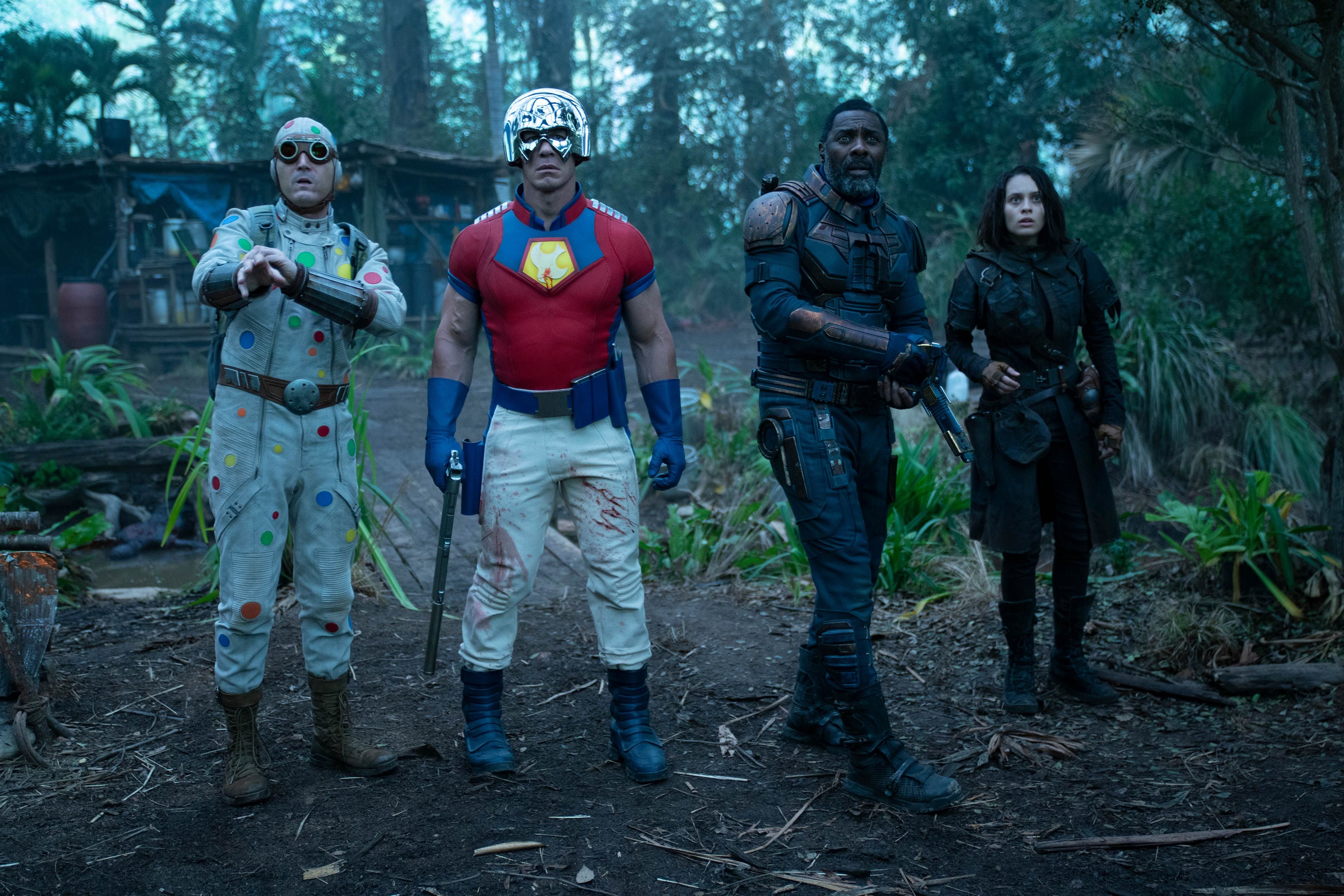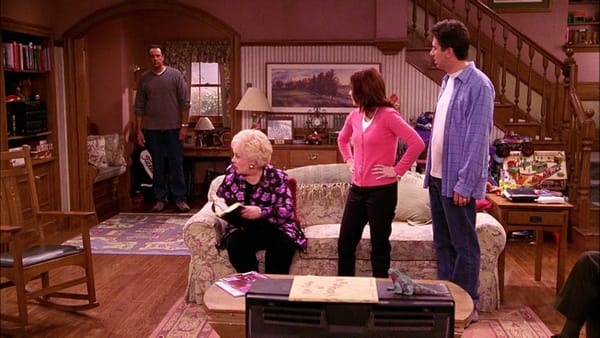The welcome vulnerability of John Cena
He's a musclebound action star who really doesn't mind being the butt of the joke.

(Each week, I’m publishing a new pop culture essay from a freelancer. Remember: Your subscription fee helps me pay these freelancers for their efforts! This week: Chris Diggins on what makes John Cena so different from so many other action stars.)
Even if you've never watched HBO Max's Peacemaker, you may have seen the viral sensation that its intro became: the opening strains of Wig Wam's 2010 song “Do Ya Wanna Taste It,” a spotlight on John Cena in a neon-drenched set, an extended dance sequence by the full cast with stoically neutral facial expressions. James Gunn's idea to make an intro bizarre enough to get people not to skip it succeeded beyond his wildest dreams. It became a viral hit so popular that Wig Wam, dropped by its booking agency right before the show came out, has been enjoying a career revival.
So it may be surprising to learn that Peacemaker's goofy dancing was something John Cena didn't really want to do. He's been quite candid that the dancing made him uncomfortable and he needed to be pushed into giving it a try by Gunn. Yet if you're familiar with Cena's career, that reticence might not come as such a surprise. The vulnerability and willingness to go outside his comfort zone and let himself look a little ridiculous has consistently made him stand out from other musclebound action stars.
Like fellow muscle hunk The Rock, Cena's career started in the outlandish world of professional wrestling. When he was first scouted by WWE, Cena was playing a Terminator-esque character called The Prototype for the indie league Ultimate Pro Wrestling, but WWE made him drop that angle in favor of a more generic good guy type. Cena himself will now happily admit that both his early characters were terribly uninteresting, enough that he was in danger of being cut entirely.
How did he end up becoming one of the biggest stars WWE has ever had? By bringing more of his own personality into his character. Specifically, his love of hip-hop. Incongruous as it may seem, Cena has a life-long love of the genre, an enthusiasm that spread to his own foray into rap under the WWE brand. His genuine affection for hip-hop music proved infectious, injecting needed energy into his wrestling persona with freestyle disses and trash-talking that soon propelled him to the heights of fame.
As Cena became more popular though, his character reverted back to more of a classic good guy type. By the time he was transitioning from being mainly a wrestler to mainly an actor, he was an all-American hero beloved by kids and ... less beloved by adult fans. Still, while his opportunities to be vulnerable on-stage dwindled, he found other ways to express that part of his personality, like his record-shattering over 650 Make A Wish Foundation visits. But despite some attempts to parlay his WWE superstar status into action stardom, like 2006’s The Marine, it would take another shocking career swerve to bring Cena big-screen success.
This time that swerve took the form of a heavy turn into comedy, especially the sorts of wacky sex comedies that were heavy departures from his previously squeaky-clean public persona. It worked though: a scene-stealing minor role in 2015’s Amy Schumer vehicle Trainwreck soon grew into major roles in movies like 2018’s teen sex comedy Blockers, all of which proved that Cena was surprisingly funny. Still, a muscular man with as much experience with physical stunts as Cena has couldn't be kept out of action for long, and he's finally found his way back to the genre with his 2021 releases F9 and The Suicide Squad, not to mention Peacemaker.
This winding career path has given Cena a refreshing lack of image-consciousness, at least compared to other big action stars. To prove it, just look at his comedy. Time and again, he has taken roles that mock his stature as a big muscle man, using his buffness as fuel for jokes. In Trainwreck he's a clueless meathead, oblivious to the sexual nature of his insults and so obsessed with protein that he talks about it during sex. Blockers is kinder, but his character is still a parody of the kind of hyper-masculinity he seemingly represents, so focused on “protecting” his daughter he can be duped into a butt-chugging contest.
Compare those roles with the comedy you typically see from action stars, which usually involves a lot of quips and insults, with perhaps a light sprinkling of sighing when things go wrong during an action sequence. Even in other comedy vehicles for action stars, the main source of comedic friction comes from the incongruity of a big tough guy doing something not stereotypically masculine (usually watching a kid). To be sure, that type of film can be perfectly funny when executed well! But it fundamentally still centers on making the protagonist look cool or charming or tough.
There's an obvious pattern here: For decades now, Cena has been willing to recognize when something isn't working and approach it from a different tack, even if he has to try something he isn't used to. And often, this means completely reinventing himself in order to get to the place he always wanted to go. Cena has talked about how loving hip-hop in the predominantly white suburban environment he grew up in led to a lot of kids bullying him. To be sure, by the time his wrestling persona debuted, a white kid liking rap would hardly be unusual, but it still requires a great deal of vulnerability to center your career on your childhood bully’s favorite target. And in his comedy, Cena’s characters aren't making jokes; they are the joke. They're not cool guys saying something clever; they're ridiculous, self-serious people who don't realize how they come off to others. It requires a lot of vulnerability to be willing to look so silly, especially in an entertainment environment where it's not the norm for guys who look like Cena. While other stars meticulously count punches and write up contracts that stipulate they can’t lose fights, Cena doesn’t mind looking like a complete putz.
Yet while it's been present for much of his career, Cena’s vulnerability was never fully utilized until James Gunn entered the picture. We see a glimmer of it in The Suicide Squad when Cena's character Peacemaker takes a dramatic turn in the final act, putting his mantra of protecting peace no matter “how many men, women, and children I need to kill to get it” to the test. Filming those scenes, Gunn was impressed by Cena, feeling “there was a vulnerability to John Cena that I would be able to help carve out and present to the world.” Giving him a chance to show that off in a leading role was part of the impetus behind the creation of Peacemaker.

Peacemaker may be the ultimate John Cena buffoon. Casually sexist, ignorant, and self-obsessed, the man naively believes every internet conspiracy that passes in front of his eyes but makes sure to pick out every piece of “empty calories” before downing a handful of trail mix. When on a mission, he fumbles and fails often, whether that means leaving an important dossier in plain view or belly flopping onto a concrete balcony from a story up. The role is decidedly not meant to make its actor look cool, but every cretinous comment and botched stunt helps build a picture of a character we can see grow beyond these failures.
And that's where Cena finally gets to show everything he can do. Beneath the buffoonery, Peacemaker is a deeply wounded character. Messed up from his upbringing by his white nationalist dad and conflicted about the values he's spent his whole life believing in, he's at a crossroads and doesn't know what to do. For most of the show, he refuses to recognize this in himself. It's the dramatic flipside of the characters Cena has always played, invested in the tough image of themselves to the point that they can't conceive of anything different. Cena plays every element of that character beautifully: the outward absurdity, the inner pain, the desperate attempts to avoid admitting his weaknesses. The performance brings the emotional heart of the character forward, allowing us to see that internal struggle in ways we would never expect. A character who could probably crush your skull between his meaty paws becomes a real person.
John Cena has the acting talent, work ethic, stunt experience, and physical appearance to follow in the too-familiar footsteps of plenty of other blockbuster action stars. That's part of what makes it so special that Cena is willing to take risks, to try new things, to be vulnerable: he probably doesn't have to. It's why it's so exciting to see where his career will take him from here. There's every possibility he won't choose the obvious path. John Cena might have the heavily muscled body of an Adonis, at a time when action stars like him are trending towards becoming invincible punch gods, but in all of his choices, in every one of his performances, he just seems so human.
Episodes is published twice per week. Mondays alternate between a free edition on various topics and a subscriber-supported edition where I recap TV shows of interest. Fridays offer pop culture thoughts from freelance writers. The Friday edition and the biweekly recaps are only available to subscribers. Suggest topics for future installments via email or on Twitter. Read more of my work at Vox.



